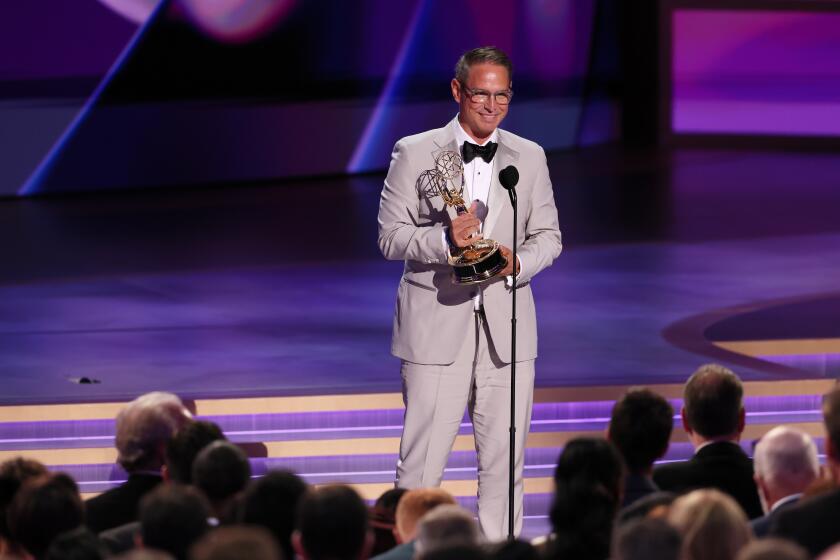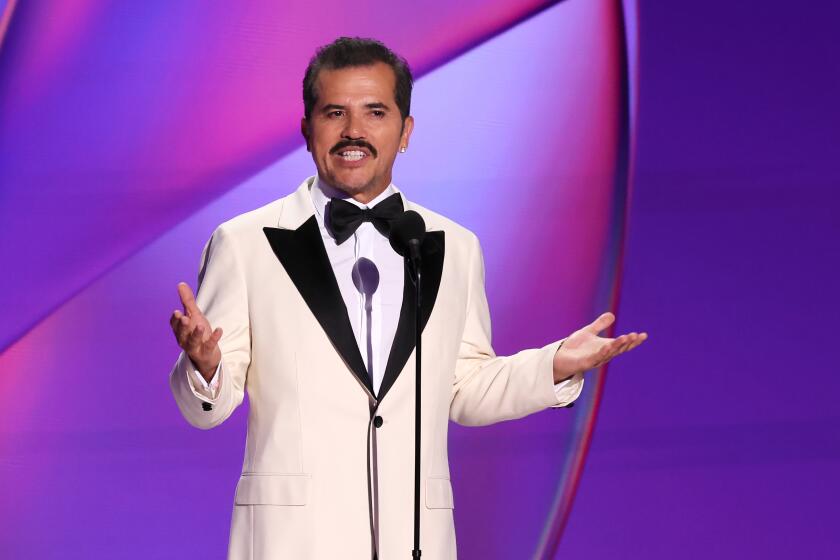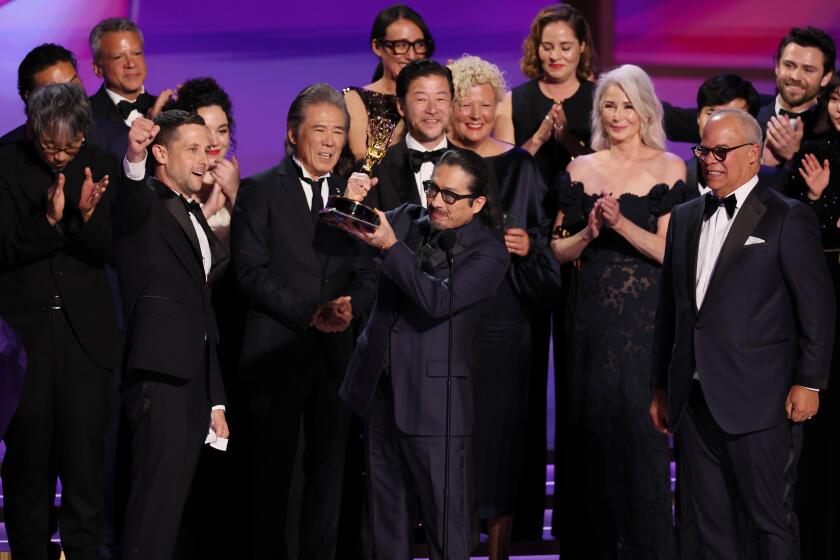The first ever virtual Emmys were the perfect awards for our times
“Succession,” “Watchmen” and “Schitt’s Creek” were the major winners Sunday at the 72nd Emmy Awards, but the biggest story was the ceremony itself. A mostly virtual celebration of an industry thrown into disarray by the COVID-19 pandemic, the three-hour socially distanced telecast replaced the usual glamorous awards show trappings with a sense of intimacy, uncertainty and, above all, surreality.
Hosted by Jimmy Kimmel, it was the first of the major industry awards shows to contend with the complicated logistics of a remotely produced live broadcast. But perhaps an even greater challenge was striking the right tone in a year of dire news, including not only the pandemic but killings by police that sparked widespread racial justice protests and devastating wildfires, which filled the skies of Los Angeles with hazardous smoke days before the ceremony.
Rather than shying away from the awkwardness, the show embraced it.
In a monologue interspersed with audience reaction shots from previous Emmys ceremonies, Kimmel addressed the depressing elephant in the room and made the case for celebrating arts — and especially TV — during “a year of division, injustice, disease, Zoom school, disaster and death.”
“What’s happening tonight is not important. It’s not going to stop COVID. It’s not going to put out the fires, but it’s fun. And right now we need fun. My God do we need fun,” he said. “We’ve been quarantined and locked down, we’ve been confined to our homes like prisoners in a dark and lonely tunnel, and what did we find in that dark and lonely tunnel? I’ll tell you what we found. A friend who’s there for us 24 hours a day: our old pal television.”
Jennifer Aniston joined him onstage to present the first award of the night and, in a bit spoofing the extreme safety measures required at an awards show during a viral pandemic, set the envelope on fire — an apt metaphor for the entire evening.
Winners — watching from home, in hotel suites or at small, distanced gatherings in unnamed locations — were handed trophies by ushers in hazmat suits styled like tuxedos. Many laughed at the strange circumstances; still more urged Americans to make a plan for voting on election day. Most nominees opted for relatively casual attire, and many covered their faces in masks. At least two — Regina King and Uzo Aduba — wore Breonna Taylor T-shirts.
Find out the winners of the 2020 Emmys with our complete list, updating live during Sunday night’s ceremony.
In lieu of presenters awkwardly bantering at lecterns before introducing a new category, stars such as Zendaya and Tracee Ellis Ross appeared solo on stage. For several categories, essential workers around the country were given the honor of handing out awards “to people who are much less essential than them,” as Kimmel put it. Other adjustments were made to the standard awards-show formula. There was a DJ instead of an orchestra. And for some reason, there was an alpaca.
The year’s honorees largely reflected the tense mood in the country. HBO’s “Watchmen,” an audacious superhero drama dealing with the legacy of race and violence in the United States, was the most nominated series of the year. It won four Emmys on Sunday night, including limited series, for a total of 11. (Many more Emmys were handed out in a series of Creative Arts ceremonies during the week leading up to the main telecast.)
Even a historic sweep by “Schitt’s Creek,” the warm-hearted sitcom about a once-wealthy family forced to relocate to a small town, showed the appeal of TV comfort food — and also Canada — at a time of domestic unrest.
The series, which airs on cable network Pop TV and became a binge-watching favorite once it became available on Netflix, dominated the first hour of the telecast. It won for comedy series, directing and writing and also clinched all four acting prizes (becoming the first show to win all seven categories in a single year), with father-son duo Eugene and Daniel Levy winning the lead and supporting actor awards.
“Our show is about the transformational power of love and acceptance — and that is something that we need more of now than we’ve ever needed before,” co-creator Daniel Levy said as he accepted the series prize at a cast gathering in Toronto.
He also urged viewers to vote — one of many urgent calls to political action throughout the night.
HBO’s “Succession,” a scathingly funny portrait of the billionaire class, won for drama series, writing and directing. Jeremy Strong also won for lead actor in a drama series for his portrayal of Kendall Roy, son of a tyrannical media mogul. Accepting the drama series Emmy from London, creator Jesse Armstrong shared a list of “un-thank-yous.”
“Un-thank-you to the virus, for keeping us all apart this year,” he said. “Un-thank-you to President Trump for his crummy and uncoordinated response. Un-thank-you to Boris Johnson and his government for doing the same in my country. Un-thank-you to all the nationalists and sort of quasi-nationalist governments in the world who are exactly the opposite of what we need right now, and un-thank-you to the media moguls who do so much to keep them in power.”
Inspired by Alan Moore’s comic books, “Watchmen” was widely praised for its prescient depiction of masked cops and a harrowing re-creation of the 1921 Tulsa Massacre. It won for writing for a limited series. Lead actress Regina King also won her fourth Emmy for her portrayal of a Tulsa police officer, while co-star Yahya Abdul-Mateen II, who played her husband, claimed the Emmy for supporting actor in a limited series.
Describing “Watchmen” as a story about “the lasting scars of white domestic terrorism,” he dedicated the award to the Black women in his life.
Read The Times’ full coverage of “Watchmen,” nominated for best limited series at the 2020 Emmys.
The actor was one of several winners to invoke themes of racial justice and tolerance, and segments throughout the broadcast profiled diverse talent including America Ferrera, Issa Rae and Lena Waithe.
Among the performers of color who won on Sunday night, Zendaya became the youngest winner ever for actress in a drama series for her role in the HBO series “Euphoria,” while Aduba took home the prize for supporting actress in a limited series for “Mrs. America.”
Accepting the Governors Award, writer-director-producer Tyler Perry reflected on the importance of inclusive storytelling by invoking the image of a patchwork quilt sewn by his grandmother. He also noted that his Atlanta studio, once a Confederate Army base, was now a place for “Black people, white people, gay, straight, lesbian, transgender, ex-cons, Latin, Asian, all of us come together, working — all coming together to add patches to a quilt that is as diverse as it can be. Diversity at its best.”
Supreme Court Justice Ruth Bader Ginsburg, whose death Friday has heightened an already contentious election, was also recognized.
If there was one thing that remained recognizable about this year’s Emmys, it was HBO’s primacy at the event a year after the conclusion of “Game of Thrones.” Although Netflix had a record number of nominations this year, it was once again HBO’s night, as its shows collected 11 Emmys on Sunday night and a total of 30 Emmys this year.
“You can’t get too distracted by the competition. That said, winning this year was particularly nice because of the questions about what HBO would do after ‘Game of Thrones.’ Hopefully this puts that to rest,” Casey Bloys, chief content officer of HBO and HBO Max, told The Times on Sunday night. “We want shows that say something about how we live and comment on society.”
Netflix won 21 Emmys this year, but only two of those came Sunday night, including the Emmy for supporting actress in a drama, which went to “Ozark” star Julia Garner.
The Emmys had the relative advantage of following a handful of socially distanced awards shows, including the BET Awards and the VMAs, as well as the Democratic and Republican national conventions, which combined pre-recorded segments with live content. Most late-night shows, including Kimmel’s, have been in remote production since March and are just beginning to return to the studio without an audience.
Watch here for live updates on the 2020 Emmys from the Los Angeles Times: Predictions, red-carpet fashion, winners and nominees, the COVID-19-affected telecast and more.
In contrast to these other broadcasts, most of the Emmys ceremony was live except for a few packaged montages.
“We’ve been watching all these other shows that have happened virtually,” executive producer Reginald Hudlin told The Times in an interview last week. “We’ve learned a lot. We’ve produced shows in this environment. So we’re taking the collective learnings of everything we’ve done so far and applying them to the first large-scale show where the awards are front and center.”
Going into Sunday night, event producers emphasized the unprecedented nature of the event. In a teleconference with reporters, executive producer Ian Stewart described it as a “logistic nightmare” and seemingly braced viewers for technological mishaps.
“Wherever possible, we are just going to go live, watching the wheel fall off and trying to put it back on and hope there’s enough wheels to keep the whole thing running,” Stewart said.
The show came together via more than 100 camera feeds around the world, including cities as far-flung as Berlin, with nominees encouraged to set up their cameras wherever they felt most comfortable. Some opted for generic backdrops, others huddled cozily at home with spouses or children. Christina Applegate sat fireside; Issa Rae stood in an empty stadium; Jennifer Aniston was joined by her “Friends” co-stars Courteney Cox and Lisa Kudrow.
Producers sent nominees kits that included high-resolution cameras, ring lights, laptops and microphones. The goal was to ensure high-quality images and sound. “We’re not making the Zoomies; we’re making the Emmys,” Hudlin told The Times.
Read The Times’ full coverage of “Schitt’s Creek,” nominated for best comedy series at the 2020 Emmys.
This year’s ceremony was broadcast from Staples Center in downtown Los Angeles, rather than its usual home, the Microsoft Theater, because the facility had the technical ability to handle the many incoming and outgoing feeds.
The broadcast came together without any major technological blunders, aside from a few glitchy images and momentarily dropped sound.
At a time when domestic production has just started to resume and thousands remain unemployed, some winners spoke of a desire to return to normalcy and continue the collective experience of making television.
Accepting the prize for variety talk series for “Last Week Tonight,” host John Oliver thanked his staff and noted he hadn’t seen them in six months.
“I miss you so much, and I honestly cannot wait until we’re in the same space together,” he said, “whenever that is.”
At Sunday’s Emmys, Ruth Bader Ginsburg and Breonna Taylor were remembered. Winners encouraged viewers to vote. And essential workers grounded the show.
More to Read
The complete guide to home viewing
Get Screen Gab for everything about the TV shows and streaming movies everyone’s talking about.
You may occasionally receive promotional content from the Los Angeles Times.






